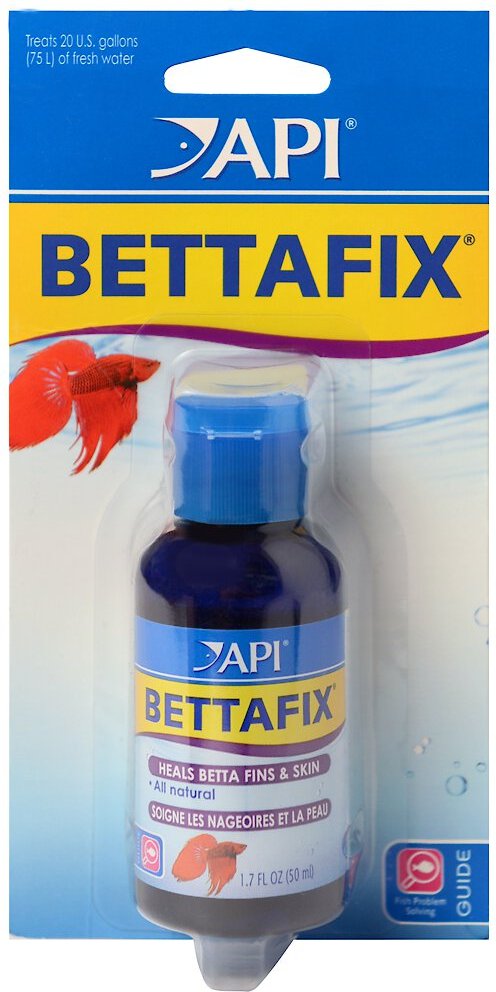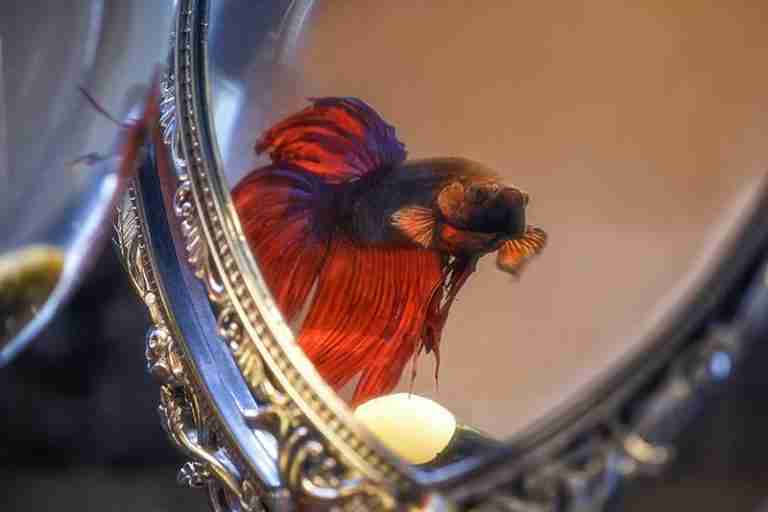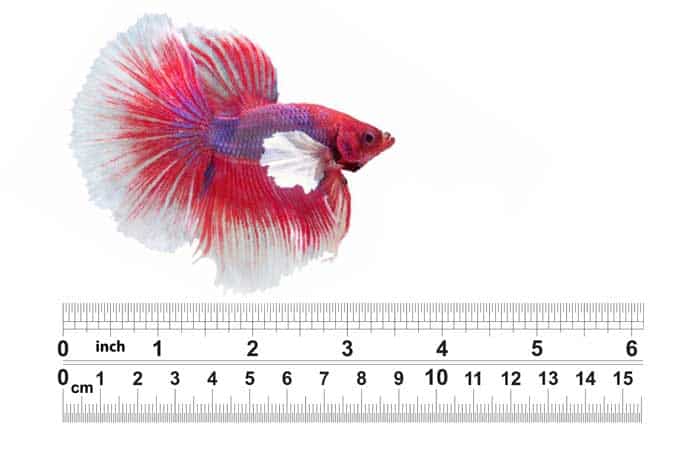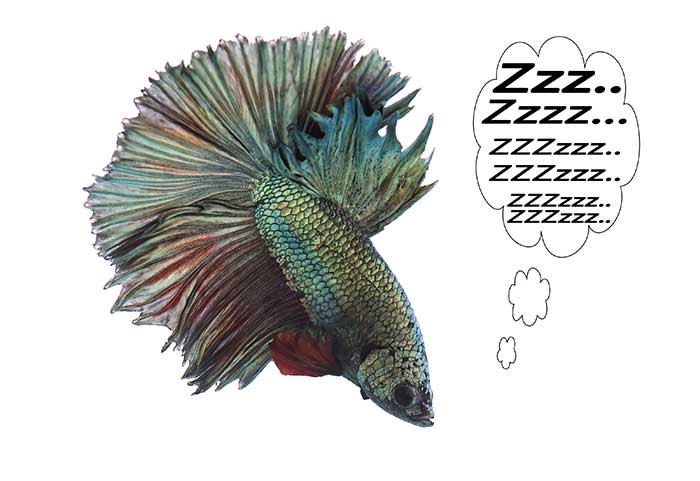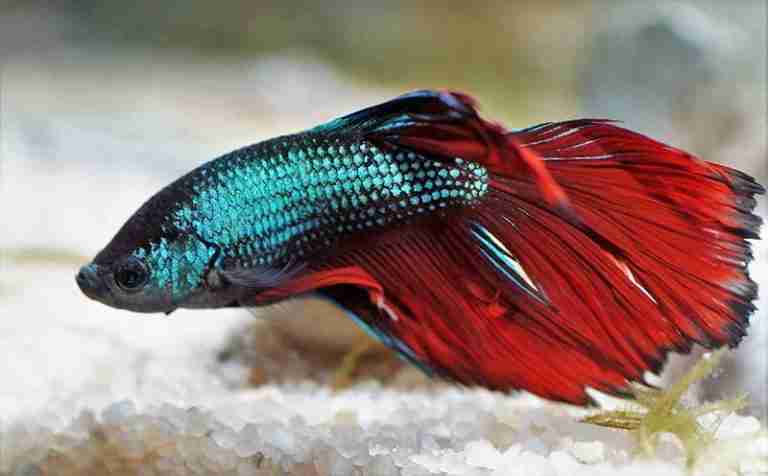Betta Fish Fin Curling – Common Causes and Fixes
Betta fish are magnificent especially male bettas with long, flowing, and colorful fins, but what if your betta’s fins suddenly began to curl up? Could your fish be sick? Maybe it’s just normal!
A betta’s fins can curl up because of incorrect water temperature, poor water quality, diseases such as fin rot, and even old age. Alternatively, Fin curling may be a genetic, congenital disorder that will only become apparent at a certain age.
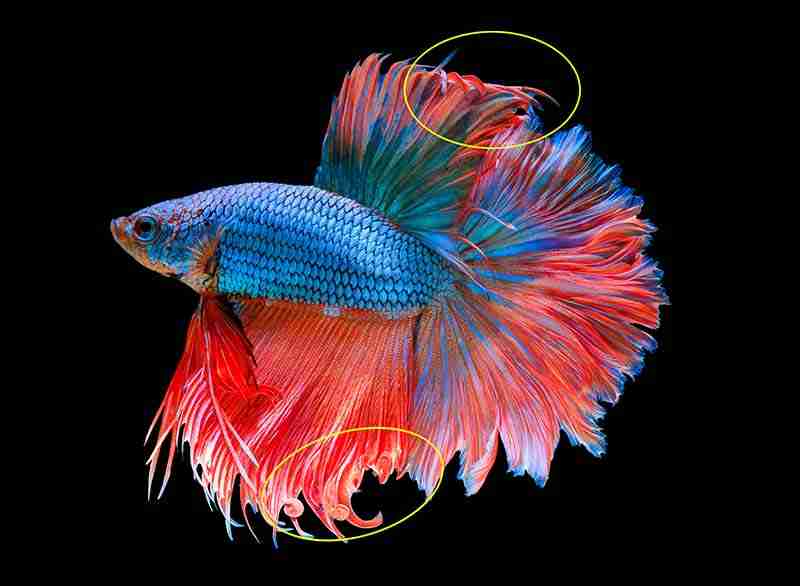
This insightful article covers the most common causes of betta fish fin curling and the most effective solutions for you to try.
Make sure to check out our Betta Fish Care Guide And Species Overview article.
Why Are My Betta Fish Fins Curling
Here are some of the most common reasons why bettas fish fins curl up:
- Constantly swimming against a current – Although this phenomenon is rare, bettas don’t like strong currents, so try turning down your filter flow rate.
- Betta fish fins can curl if the betta is stressed or traumatized – If your Betta suddenly starts to display fin curling, it could be because it’s frightened or trying to protect itself.
- Wrong water temperature – Betta fish fins can curl up if the water temperature is consistently too high or too low for a betta fish. The ideal temperature range for betta fish is between 78-82° Fahrenheit or 26-28° Celcius.
- Poor water conditions can cause a bettas fins to curl – High ammonia levels are a good example of this and are quite commonly a factor. Perform regular water checks to rule this one out.
- Genetic, congenital illness or disease can cause fin curling on your betta – This problem would be present from birth but often unnoticeable until the betta has matured.
- Old age is also a common reason for your betta fish to have curling fins – As betta fish get older, they generally lose color, and their fins become a little rough around the edges. This is quite normal, and some curling can occur.
- Fighting and fin nipping can cause your betta frayed fins – Constant fighting can cause infections and stress and can lead to fins curling over or far more serious problems.
There is no single reason why betta fin curling happens. It isn’t easy to pinpoint the exact cause when it happens, but the list above can help you narrow down the cause.
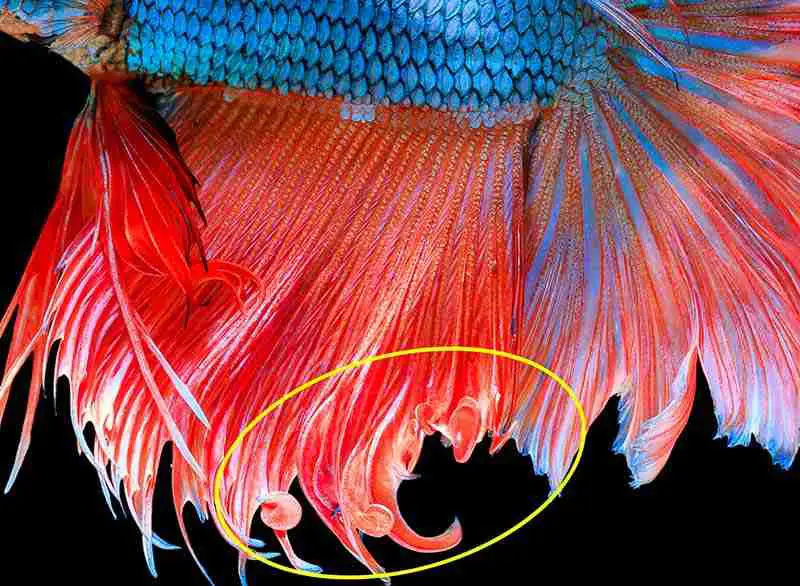
Why Is My Betta Fish Tail Curling
If you notice your betta fish tail curling, it is probably related to fin curling, and its cause will be the same. Although this article doesn’t cover every conceivable reason for fin curling, the most common reasons are covered and can usually be applied to tail curling in betta fish.
Early Stage Betta Fish Fin Curling
Tail curling in betta fish can actually be the early stages of your betta’s fins curling up. If you notice your bettas tail curling, it may not progress any further than this, however, you should not be alarmed if it does progress to your betta’s fins.
The rest of this article will delve a little deeper into the reasons behind fin curling in betta fish, and it can also be applied to tail curling.
Why Do Betta Fish Fins Curl
It can be quite unusual or worrying to see, but what does it mean when betta fish fins curl?
Apart from being a birth or genetic abnormality, why a betta’s fins curl is not widely known. The muscle fibers may weaken over time or during illness, causing the tips not to extend out fully.
Similarly, when fin rot strikes, there may be damage to the muscle fibers around the fin edges, or as the tissue dies, there will be no fibers to stretch out.
Fin curling in betta fish usually occurs when the fins have grown to a good length and isn’t usually noticeable with shorter fins.
If an older betta fish suffers from a birth abnormality or genetic defect, some or all of its offspring (fry) will likely suffer from the same defect, and it won’t often become noticeable until later in life, usually by 1 year of age.
Can Stress Cause A Betta’s Fins To Curl
Stress can cause a betta’s fins to curl, dramatically affecting a betta fish’s general health. Stress is the cause of many problems in betta fish and directly impacts a betta fish’s immune system.
Betta fish are often subjected to poor living conditions, such as small tanks and dirty water, which can cause ammonia poisoning. Betta fish may also experience shock from temperature changes, bullying by other tank mates, or even bullying from an owner. All of these things can lead to betta fins curling.
Any sudden change in your betta tank’s temperature can cause stress to your betta fish, such as a malfunctioning or broken heater, or if you set your aquarium’s water temperature too high or low for extended periods, also stress your betta.
Below is a list of common factors that will often cause stress to your betta fish:
- Incorrect tank temperature or sudden temperature changes.
- Exposure to loud noises.
- Changes to the Betta Fish Tank’s Water Parameters (Use test kits regularly).
- Pollution in the Betta Fish Tank causes spikes in ammonia, nitrate, and nitrite levels (Use test kits regularly).
- Exposure to irritants such as household chemicals or certain medications.
- Bullying from other tank-mates.
- Boredom, which can be caused by a lack of decor or other tank mates.
- Incorrect food or poor diet may result in malnutrition.
The list above is not exhaustive, but you can see many reasons why betta fish can become stressed.
Although it’s easy for Betta fish owners to assume that stress is nothing more than a sign of poor water quality, which they can easily fix, stress can be caused by many other things or a mixture of factors. Betta fish are very sensitive creatures, and even the smallest change in their routine can lead to stress and their fins curling.
If you suspect ammonia poisoning, you will need to test your tank water immediately with a test kit and perform a water change to help reduce ammonia levels. You will need to repeat water changes until you have zero ammonia in your tank.
Keeping a clean and healthy tank is paramount in maintaining a betta’s health. It would help if you understood when to clean your betta tank and how often to change the water in your betta tank.
Before I move on, I would like to mention that Indian almond leaves are talked about quite often in betta forums as a good natural remedy for many betta ailments, including stress. Indian almond leaves have many antibacterial properties that benefit your betta tank.
Take a look at the video below if you want to learn more about this natural remedy.
Indian almond leaves are available to buy in some specialist pet stores and are more widely available online. I will often buy them because there is more choice and better prices.
Are Betta Clamped Fins Related To Fin Curling
If your betta fish has clamped fins, it can often lead to fin curling. Clamped fins in betta fish are simply where the fins become clumped together and tight instead of flowing freely. Stress is a common factor if your betta’s fins are clamped together.
I described in the previous section how stress can dramatically affect your betta’s health, and fin clamping is yet another sign of this.
You will need to try and identify whether there is a trigger for your betta’s stress or if it is down to illness. Treating the cause of the stress will usually help the fins to relax and stop your betta’s fins clamping together.
Age-Related Fin Curling
Age can play a factor in your betta’s fins curling over and is probably caused by a general weakening of muscle tissue. You will usually find curling fins in male betta fish because their plumage is much longer than female bettas.
When fin curling is caused by old age, you will usually notice the dorsal fin curling because of the weight on top, whereas the ventral fins, which hang below, will remain straight due to gravity.
Often when curled fins are brought on by stress or illness, the ventral fins will also begin to curl. Age-related fin curling is nothing to worry about and may or may not rectify itself.
I wrote an article about how to tell if your betta fish is dying of old age, which talks a little more about age-related symptoms in betta fish, and I also wrote an article about explaining betta fish behavior before death which has lots of helpful information.
Betta Fin Curling Through Illness
Bettas are susceptible to many illnesses, often caused by a lowered immunity from stress. However, not all illnesses are caused by stress. When adding new fish or plants into your aquarium, you may inadvertently introduce a parasite or bacteria which can spread through the tank.
Betta fish generally suffer from 4 main illnesses, which are:
- Fin Rot.
- White Spot (ich).
- Dropsy.
- Velvet.
Any illness that will make your betta feel under the weather may also cause fin curl, and the solution is to treat the illness with medication obtained either commercially through a pet store or fish store or medication obtained through a vet.
Aquarium salt is also used often in low doses to prevent or help soothe tail and skin issues. Aquarium salt is available to buy in most pet stores and online. Below is a link to the salt that I use.
Treatment Of Fin Curl In Your Betta
There is no treatment that addresses all causes of and types of fin curl, so you will need to follow the guidelines throughout this article when trying to find the cause of the fin curl.
One treatment that is beneficial to many fin issues, including fin curling and fin rot is Bettafix by API. It is a good, general bacterial and antifungal treatment that contains healing melaleuca, (a variety of tea tree) and can help to speed up the healing process.
You can purchase Bettafix in many fish stores and online, and I have dropped an (affiliate) link below for the correct product.
Once you understand the likely cause of the fin curl, you will better understand how best to treat it.
Fin curl caused by stress will require you to identify the cause of the stress. For example, bad water quality will require you to improve the water quality or temperatures outside of the recommended range will need to be fixed.
It cannot be fixed if your betta’s fin curling is caused by old age or a genetic or birth abnormality.
If your betta’s fin curl is caused by illness, you will need to correctly diagnose and treat the illness, which will sometimes require you to seek the advice of a professional.
Conclusion
Hopefully, this guide has given you a little insight into fin curl in betta fish, its likely causes, and how to remedy it.
Knowing that fin curl can be the symptom of an underlying illness can give you some awareness of an illness you may not have otherwise known about.
Understanding that fin curl may be genetic and a simple congenital disability can give you peace of mind that your betta may not actually be unwell.
Realizing that stress can have a large part to play in many conditions, including your betta fish’s fins curling up, can help you spot the possible triggers for stress before further illness ensues.
Although these problems are fairly common, they are not often fatal, and the more you learn to spot the signs, the more successful you will be at raising your betta fish and any fish.




